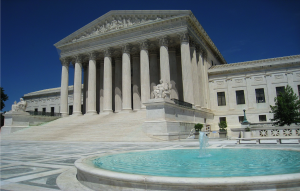Rippo v Baker
No. 16-6316
United States Supreme Court
Decided on March 7, 2017
Issue: Whether the Nevada Supreme Court erred when it required evidence of actual bias to demand recusal.
Holding: The U.S. Supreme Court held that evidence of actual bias is not required to demand recusal.
Facts: Rippo was sentenced to death after a Nevada jury convicted him of first degree murder along with other charges. Upon discovering that his trial judge may have been involved in federal bribes, Rippo suspected that the district attorney’s office was investigating the case. Rippo made a motion to disqualify the judge under the Due Process Clause of the Fourteenth Amendment stating that it was impossible for a judge to impartially adjudicate a case in which one of the parties was investigating him, but the judge declined to recuse himself. The trial judge was indicted on federal charges and a new judge denied Rippo’s motion for a new trial.
On appeal, the Nevada Supreme Court affirmed the decision, holding that Rippo did not have evidence that state authorities were involved in the investigation. Pointing to documents from the judge’s own trial that supported his claim that the district attorney’s office had been involved with the investigation, Rippo sought postconviction relief. The court denied relief and the Nevada State Supreme Court affirmed.
Analysis: In Bracy v. Gramley, a U.S. Supreme Court case involving a judge who accepted bribes to rule in favor of some defendants and against others who did not bribe him, the Court held that the petitioner was entitled to a discovery hearing. There, although the nature of the case was speculative, the petitioner had alleged facts suggesting that his defense counsel may have schemed with the judge to rush the trial. The Nevada Supreme Court held that, unlike Bracy v. Gramley, since Rippo’s allegations did not support the assertion that the trial judge was actually biased, Rippo was not entitled to an evidentiary hearing.
The U.S. Supreme Court held that the Nevada Supreme Court applied the wrong legal standard. They noted that under the Due Process Clause, a judge may sometimes require recusal even when a judge has no actual bias. To determine whether recusal is required, courts look to whether the probability of actual bias on the part of the judge or decisionmaker is too high to be constitutionally tolerable. Because the Nevada Supreme Court did not ask the question of probability but, rather, actual evidence of bias, the U.S. Supreme Court vacated the judgment.


